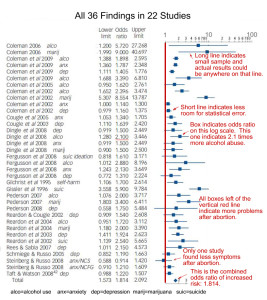Study Finds Increased Risk of Mental Health Disorders After Abortion
9/16/16
Women who have abortions face a higher risk of mental health disorders according to recent study of young women in the United States.
The study, published by Dr. D Paul Sullins of Catholic University of America, used data from the National Longitudinal Study of Adolescent to Adult Health. The study followed more than 8,000 women for a period of 13 years:
After adjusting for demographic differences and other factors, the study found that abortion during these years elevated a woman’s risk of mental health disorder by 45 percent.
“One-eleventh of the prevalence of mental disorders examined over the period were attributable to abortion,” the study’s abstract said.
The study sought to examine any links between pregnancy outcomes like birth, abortion or miscarriage and mental health outcomes for U.S. women during the transition to adulthood. It drew on a national study of 8,005 women that surveyed them three times at average ages of 15, 22 and 28.
Involuntary pregnancy loss was associated with a 24 percent elevated risk of mental disorder, while childbirth was “weakly associated” with reduced risk of mental disorder.
Risks of Abortion Confirmed in Prior Studies
Previous studies have also found an increase in mental health risks following abortion. A 2011 meta-analysis of 22 studies found that abortion is linked to an 81 percent higher risk of mental health problems. The greatest increases in risks were suicidal behaviors and substance abuse.
The meta-analysis combined results from 22 studies covering 877,181 women from six countries. All 22 studies revealed higher rates of mental health problems associated with abortion for at least one symptom.
Women with a history of abortion faced higher rates of anxiety (34 percent higher), depression (37 percent higher), heavier alcohol use (110 percent higher) and marijuana use (230 percent higher), and higher rates of suicidal behavior (155 percent higher). In contrast, women who delivered an unplanned pregnancy were significantly less likely to have mental health problems.
Pro-Choice Expert Concludes There Are No Benefits from Abortion
Yet another meta-analysis combining the results of eight studies of women who experienced unwanted pregnancies, published in 2013, concluded that “there is no available evidence to suggest that abortion has therapeutic effects in reducing the mental health risks of unwanted or unintended pregnancy.”
The lead author of that review is Professor David Fergusson, a self-described pro-choice atheist. Fergusson also authored a 2008 study which found that women who continued an unwanted or mistimed pregnancy did not experience a significant increase in mental health problems. But women who had abortions did experience more complications.
According to Fergusson, “[T] here is no evidence in the literature on abortion and mental health that suggests that abortion reduces the mental health risks of unwanted or mistimed pregnancy. . . . Although some studies have concluded that abortion has neutral effects on mental health, no study has reported that exposure to abortion reduces mental health risks.”
The Elliot Institute has called for congressional hearings to investigate the risks of mental heath problems after abortion.
~~~
Learn More
Higher Death Rates After Abortion Found in U.S., Finland and Denmark
Women’s Suicide Rates Higher After Abortion: New Study
Most Studies Show Abortion Linked to Increased Mental Health Problems
Study Finds Abortion Provides No Mental Health Benefits to Women, Even When Pregnancy is Unwanted
Abortion Has No Benefits, But Does Have Risks
More Research Articles
Online Bibliography of Studies on the Detrimental Effects of Abortion
Find Help
Pregnancy Help and Resources
Post-Abortion Help and Resources



